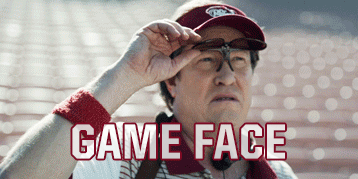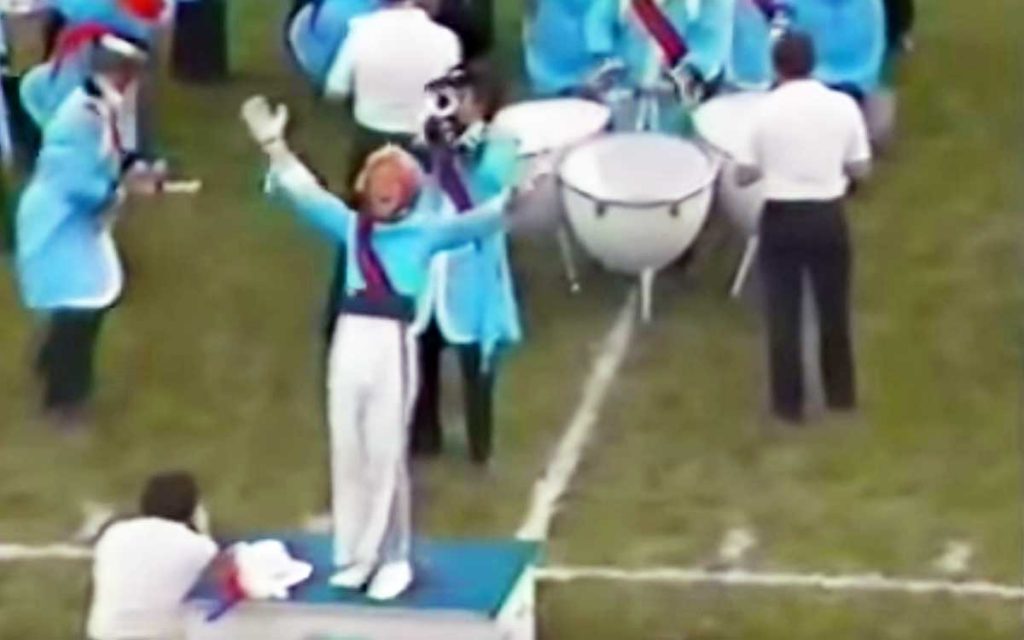
What makes a good drum major? Well, every band is unique, but most drum major positions need the same few skills.
After 40 years of training intensely motivated drum majors across the United States and the world, here’s what we’ve learned.
Here are the 7 simple things every drum major should do.
1. A good Drum Major is early
 To be early is to be on time. To be on time is to be late.
To be early is to be on time. To be on time is to be late.
As much as I hate being late, I don’t even like just being “on time.” If I’m exactly on time to an event, a class, a rehearsal, I feel like I’ve lost an opportunity to take a breath, to get my bearings, to get my head in the game.
Olympic divers don’t just run up the ladder and fling themselves off the board.
They pause, breathe, center themselves—they look to make sure there’s water in the pool—all of which helps them lessen the possibility of things going badly wrong.
Be early, except when you’re late
You can’t always be early. Got a 4-minute walk to class and only 3 minutes to get there? Yeah, we all do. It happens.
But in those cases, #5 below will at least give you a chance of hitting the ground running instead of stumbling and doing the big face-plant.
(Spoiler alert: #5 talks about being prepared. Being early can in fact be in the service of #5 below.)

When you arrive somewhere early, you give yourself the time to prepare one last time, and the chance not to seem flustered right out of the gate.
You never get a second chance at a first impression. A good drum major tries to be early whever possible.
2. A good Drum Major is supportive
 Show support for others before they show support for you.
Show support for others before they show support for you.
We’ll score points with our bands (in fact, with anyone) when we make the effort to take care of them, to listen to them, to thank them for their work, to treat them kindly, without their having asked for such.
But more than “scoring points,” this is really about creating a positive atmosphere.
This can be hard sometimes, because people don’t always agree on everything all the time.
But if we’re supportive of others, consistently, in a sustained way – without maintaining a mental scoreboard, but just because it’s a constructive way to operate – the someone will benefit.
Who benefits?
It may be the whole band, because they appreciate the support and finally grasp why we were being such smiling, helpful people all the time.
It may be the one freshman who’s having a miserable day until we stop to reassure them that it’s okay, everybody’s struggling, and can we get you another cup of water, since it’s hot out here?
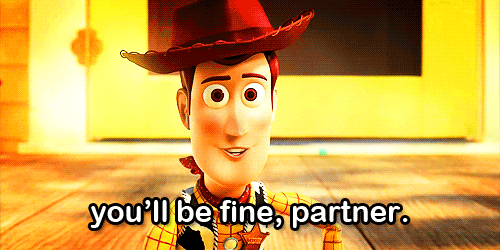
Or at the very least, YOU may feel better, because whether things work out or they don’t, you know we’ve done everything you can do to build people up rather than breaking them down.
A good drum major works to create a positive environment. Speaking of being positive:
3. A good Drum Major is enthusiastic
 Make sure you love what you’re doing—whether you like it or not.
Make sure you love what you’re doing—whether you like it or not.
While we’re on that subject – look alive! Stay awake! Be alert! Be on—all the time.
No one is like that 24/7. No one. But we’ve got to keep our down moments—our exhaustion, our dismay, and our bad moods—tucked away in places and times where our bands can’t see them.
Drum majors are always “on stage.”
Not feeling it? Fake it.
If the leader of any group is operating at 100%, that group will probably reflect that energy back at about 70%.
By the laws of intergalactic band math, if you want your group to be at the absolute top of their game, you have to be at 143%.
Let’s put it another way:
You can fake energy, but not passion.
Just about everyone has a “BS-meter.” It’s how you can tell when someone’s being straight with you or if they’re joking or lying.
Middle school and high school students’ BS meters are even more perceptive than most adults.
If you’re not putting everything you have into your job while you’re in front of our bands, THEY’LL KNOW.
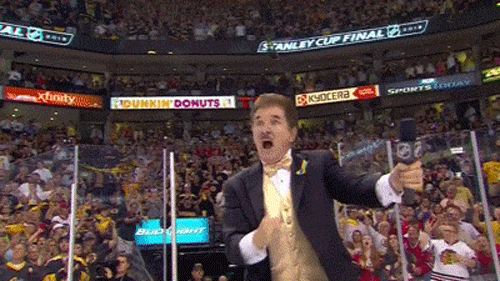
But, consider this:
Why did you get into band in the first place? Why did you stay in? Why do you still keep at it?
Chances are pretty good that you looked forward to becoming drum major because you just LOVE the activity.
That’s all it takes. A good drum major shows their love for the activity.
4. A good Drum Major is an example
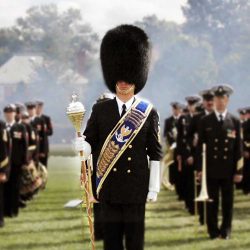
You are a leader. Act like it.
How can we get people to love band if we don’t appear to love band? How can we expect people to behave responsibly if we’re not willing to?
Do we want our bands to be enthusiastic? To listen to the director well? To put everything they have into everything they do?
Then we simply CAN’T NOT do those things. And, as we said in #3, at least 43% more than the rest of the band!

How do you wish your band would be?
We’ve said it in lots of different ways, but it really is about being the first one to hit the field and the last one to leave.
It’s about doing what needs to be done, when it needs to be done, whether you like it or not.
And lots of times, it’s about figuring out what needs to be done before anyone has to tell you.
A good drum major thinks ahead. Speaking of which:
5. A good Drum Major is prepared
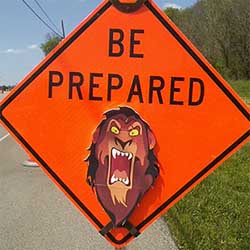
If you fail to plan, plan to fail.
Be ready. Study the scores. Practice conducting the scores. Know the instrument part cold, if you’re one of those DMs who marches and plays a tune or two.
Study the drill pages. Look for the challenging drill moves that may need extra effort to teach or clean—Bonus points if you can learn the drumline music.
George N. Parks, our legendary founder and continuing inspiration, frequently taught us that “a good teacher must be able to reinforce demonstrations with clearly-worded explanations. Even the simplest move, which you fully understand, cannot be taught unless you prepare the proper wording first.”
Expect the unexpected…ahead of time
Imagine things that the director MIGHT ask for (“can you warm up the winds?” “can you work with the percussion?” “can you teach this new member to march in about five minutes?”) and figure out ways to do them in a way that people wouldn’t guess that the whole thing was improv.
Imagine what emergency might happen during a parade, or pregame, or halftime, or a standstill concert. And figure out what you could do to make your band feel like there’s someone competent and caring getting them through it.
A good drum major does their homework. Speaking of which:
6. A good Drum Major is professional

You’re still a kid. It’s ok to act like one. Just not during band time.
In fact, if we’re wearing band swag or anything that links us to our organizations, we need to consider how professional we may need to look.
Other people don’t care that it’s not “band time.” You represent your band, even when you’re not officially on the clock.
What should the audience say about your band?
So, in or out of rehearsal, in or out of uniform, let’s be classy. Let’s be dignified. Let’s be positive. Let’s show good judgment and taste.
Let’s avoid letting our personal lives interfere with the jobs we need to do. Let’s use tact—”the art of making a point without making an enemy.”
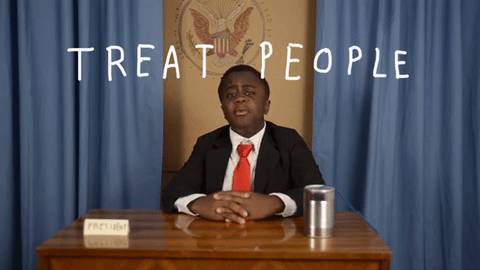
Let’s praise in public and critique in private, and even then, be decent about it. And even though drum majors get attention almost constantly, let’s be sure we’re getting it for the right reasons.
Let’s remember that we’re always on stage and always being evaluated on how well we help our bands, rather than how good we look in our uniforms.
A good drum major acts the part all the time.
7. A good Drum Major is a servant
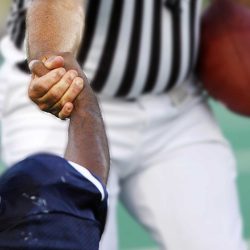
Leaders serve.
This is something that people who have held elected office throughout our history have occasionally forgotten: they’re in public service for a reason. They’re serving the public.
Now, it’s not a title we imagine announcing from the press box: “Band servant Juan Smith, is your band ready?” “The color guard is served by Bess Mason.”
But that’s probably how our brains should translate it.
It’s so much more than conducting
A drum major is a role model, a friend, a mediator, a teacher, a protector. Part of our job is to make sure that the scared freshman doesn’t quit before the end of band camp. Part of it is to make sure the upperclass marchers help us to keep the band moving forward.

And part of our job is to lead people in ways that don’t look like standing-on-the-podium, commanding-the-block, deep-bows-at-the-end-of-the-tune.
Sure, DMs do those things too. But that’s the easy stuff. Serving is much more important.
A good drum major puts the needs of the group before their own.
Ok, but how?
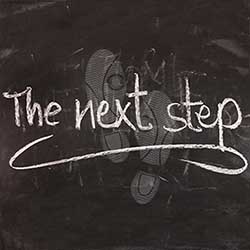
There are textbooks that identify these Seven Things, these job requirements, these personal qualities. But there aren’t textbooks or videos that show us exactly how to be these Seven Things.
That’s what makes this so hard:
You have to find it in yourself.
That can mean finding something inside us that we didn’t know was there – or didn’t previously believe was there.
That’s the great thing about the drum major position. Many former DMs would probably tell you that they emerged from their experience a very different person than when they began it.
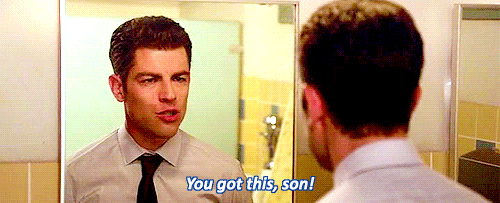
The major challenge: appearing to do those 7 Things Every Drum Major Should Do, sometimes before you think you’ve got them down.
We’ve all been there, though. And the work is worth it.
Bonus! Study physics

Sound delay is real!
And it’s a big deal. So big, in fact, that many of the most successful programs spend entire lessons or rehearsal blocks on demonstrating it and teaching how to compensate for it.
Just one more thing to make the drum major’s job harder! But lucky for you, we wrote up an entire article on how a drum major can understand and deal with marching band sound delay.
The short answer? Use your eyes, not your ears. It’s hard. Practice.
There you have it.
None of these Seven Things can be purchased, of course.
We can learn about these things from other people. We can read stories from former drum majors about how life worked out when they did (or didn’t) do these things. But to really get it, we need to dig around and find these abilities in ourselves—for ourselves.
Mostly, we’ll simply need to decide to be these Things, which is not always simple. But, as the saying goes, if you act the part long enough, you become it.”
And as our remarkable DMA colleague Dr. Tim Lautzenheiser points out, “how can you possibly expect to lead others if you can’t lead yourself?”
What did we miss?
Got any other Things a drum major should do? Please let us know in the comments below and PLEASE SHARE THIS POST!
We’re trying to reach as many people as we can. The more good drum majors there are in the world—the better!
Thanks for reading.




